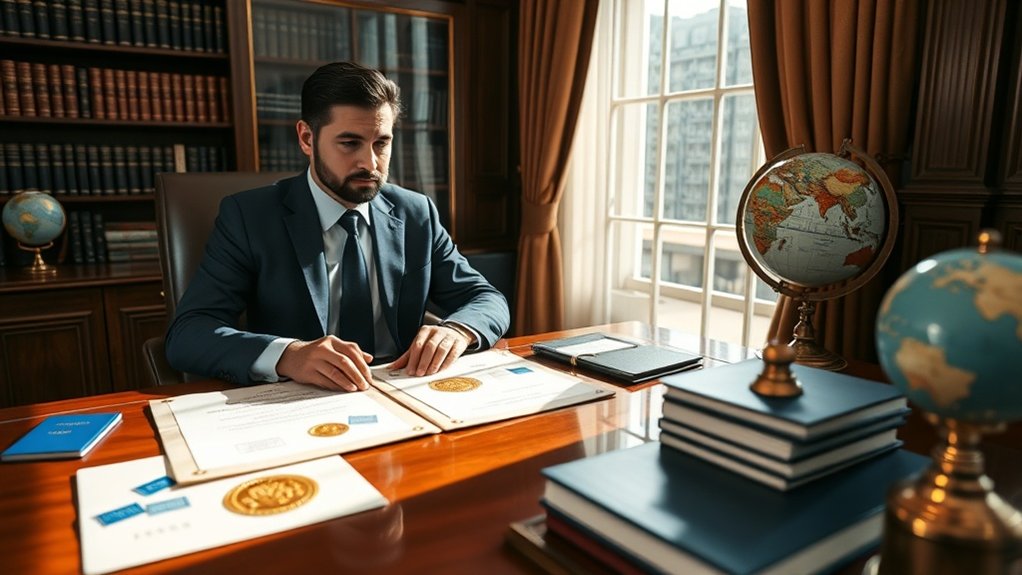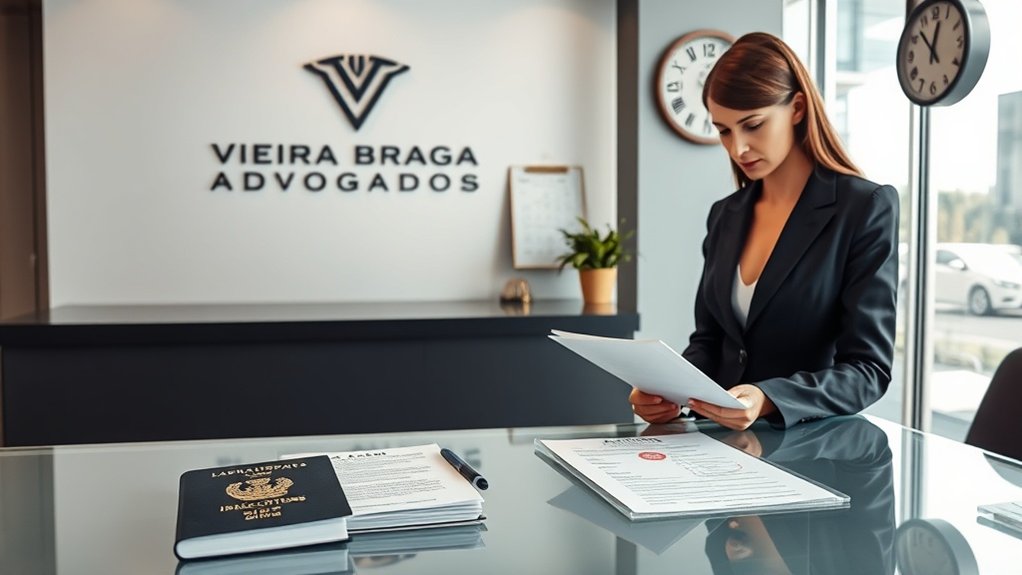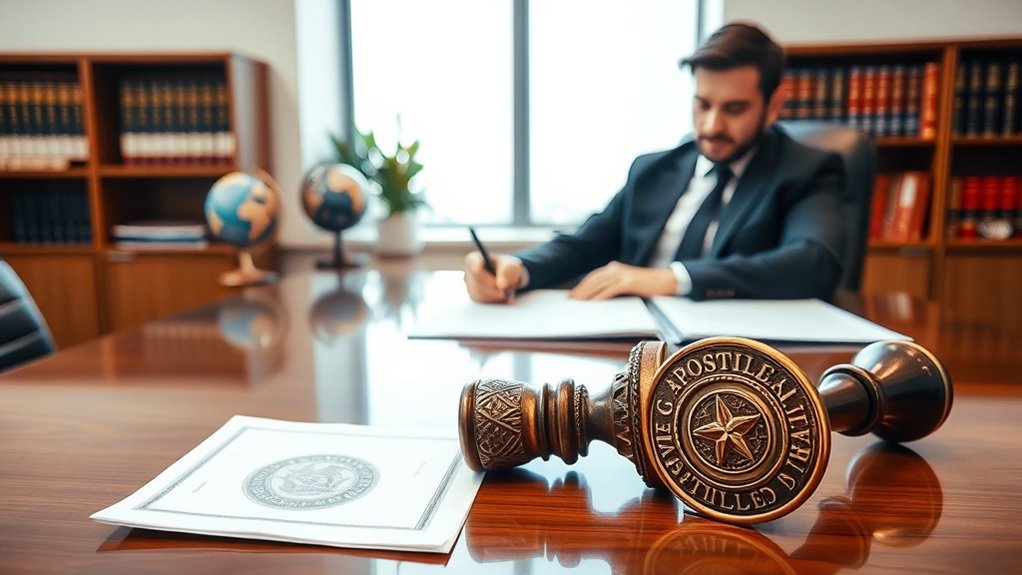If you’re facing the complicated process of getting Afghan documents recognized abroad—especially for use in Brazil—you know it’s rarely straightforward. With shifting rules in Afghanistan and strict Brazilian requirements, it’s easy to get lost or risk delays. That’s where Vieira Braga Advogados steps in, offering precise guidance for apostilles or alternative legalizations. Want to know how their expertise could save you time, frustration, and costly mistakes? There’s more to consider before you move forward.
Understanding Apostille and Legalization for Afghan Documents

Navigating international documentation can be tricky, especially when you need to use Afghan documents abroad. You’ll often encounter terms like “apostille” and “legalization,” but they aren’t the same. An apostille certifies the authenticity of documents issued in countries that are part of the Hague Convention, making them valid across member states. Unfortunately, Afghanistan isn’t a Hague Convention member, so you can’t obtain an apostille for your Afghan paperwork.
Instead, you must go through a process called “legalization.” This means your documents require endorsement by the relevant Afghan authorities, often followed by authentication at both the Afghan Ministry of Foreign Affairs and the embassy or consulate of the destination country. Each country sets its own requirements, and the procedures may vary. Understanding these distinctions is crucial, so you know exactly what steps to follow. This ensures your Afghan documents will be recognized and accepted internationally. Working with professional guidance can help ensure compliance with country-specific documentation and reduce the risk of errors or application rejections.
Common Challenges With Afghan Document Legalization
Although you might expect a straightforward process, legalizing Afghan documents often proves challenging due to shifting government procedures and limited international recognition. You’ll quickly find that Afghan ministries frequently change requirements or suspend services without notice, forcing you to navigate an unpredictable system. Documentation provided by Afghan authorities may not always align with international standards, making it hard to satisfy the expectations of foreign embassies or institutions.
Security concerns can complicate things further. If you’re outside Afghanistan, you might struggle with remote access to official records, or you could face delays because of travel restrictions or embassy closures. Many countries don’t recognize Afghan-issued documents as readily as those from other nations, given Afghanistan’s political instability and lack of Hague Apostille membership. This means you’ll encounter longer processing times, extra verification steps, and requests for additional evidence of authenticity. Every step demands diligence and patience when working with Afghan documents. In these circumstances, consulting a professional specializing in immigration law expertise can significantly increase your chances of success and help you navigate unique legalization challenges.
When Apostille Is Not an Option: Exploring Alternatives

Because Afghanistan isn’t a member of the Hague Apostille Convention, you won’t be able to obtain a standard apostille for Afghan documents. Instead, you’ll need to explore alternative legalization options to ensure your documents are recognized abroad. One primary route involves embassy or consular legalization. Here, you’ll first authenticate your Afghan document with the relevant local authority in Afghanistan. Once authenticated, you’ll submit it to the embassy or consulate of the destination country for final legalization.
This multi-step process can be time-consuming, and each country may impose distinct requirements. Make sure to verify current procedures with both Afghan authorities and the receiving country’s diplomatic mission. Professional guidance can help prevent critical errors and missed steps. In addition, consider consulting a legal advisory firm familiar with international document legalization, especially if you’re navigating this process for the first time. With the right preparation, you’ll be able to legitimize your Afghan documents effectively. Working with an experienced immigration lawyer can also help you ensure all legal requirements are met and avoid complications similar to those faced when handling complex visa processes.
While Brazil welcomes foreign documents, you’ll need to follow specific procedures to ensure their validity in legal or official matters. Brazil doesn’t automatically accept documents from abroad—even those issued by Afghan authorities—without proper authentication or legalization. If your document comes from a country outside the Hague Apostille Convention, like Afghanistan, you must arrange consular legalization to have it recognized in Brazil.
First, you’ll need the original document translated by a sworn (public) translator in Brazil, as Brazilian authorities only accept documentation in Portuguese. After translation, local notaries or public offices will require documents to be legalized or otherwise verified before you can use them for official business such as immigration, business registrations, or court matters.
You can’t ignore these requirements; using unauthenticated documents can delay or jeopardize your legal processes. Understanding and adhering to Brazil’s standards prevents complications and sets the foundation for a successful transition or transaction involving foreign paperwork. Seeking assistance from specialized legal support can help you avoid errors and ensure compliance with current Brazilian regulations for foreign documents.
Step-by-Step Process Managed by Vieira Braga Advogados

Navigating the legalization of Afghan documents in Brazil involves several critical steps, and Vieira Braga Advogados streamlines the process so you don’t miss any essential requirements. When you rely on their expertise, you’re guided through each stage with clarity and precision, ensuring your documents meet Brazilian legal standards without unnecessary delays. Their team manages the entire workflow, tackling bureaucratic hurdles so you can focus on your main objectives.
Here’s how they handle your case:
- Document Assessment: Vieira Braga Advogados reviews your Afghan documents to identify required legalizations or apostilles, checking for any missing or incorrect details.
- Procedure Coordination: They oversee the submission to Brazilian authorities, ensure translations are properly certified, and follow up on the progress to keep things on track.
- Finalization and Delivery: Once legalized, your documents are promptly returned to you along with clear instructions for their legal use in Brazil.
Understanding complex Brazilian immigration laws is essential, and working with a specialized team helps ensure your documentation aligns with the most up-to-date legal requirements, saving you from potential delays or complications. Rely on their proven process to keep your documentation journey efficient and hassle-free.
Personalized Solutions for Complex Cases
Even with an organized process, some Afghan documents present unique challenges that require more than a one-size-fits-all approach. You might encounter issues like missing authentication stamps, unusual document formats, or sensitive content that complicates the legalization or apostille process. That’s where Vieira Braga Advogados steps in with personalized strategies tailored specifically to your situation.
Their team analyzes the complexities of your documents, consults with relevant authorities, and identifies alternative solutions if the conventional route isn’t possible. You’ll benefit from clear recommendations—whether that means pursuing consular legalizations, addressing gaps in documentation, or coordinating specialized translations.
Instead of facing bureaucratic hurdles alone, you have access to expert guidance and custom solutions every step of the way. By entrusting Vieira Braga Advogados with your challenging Afghan documents, you’ll move forward confidently, knowing your unique case receives the careful attention it needs to achieve a successful outcome. With their support, you can better avoid risks such as visa denials or legal setbacks that often arise from documentation errors in immigration processes.
Required Documentation and Typical Timelines

Before starting the apostille or legalization process for Afghan documents, you’ll need to gather specific paperwork to ensure things move smoothly. Getting organized from the start minimizes delays and avoids unnecessary obstacles. Here’s what you should have ready:
- Original Document – Bring the official Afghan document you want apostilled or legalized. It must be in good condition and, ideally, recently issued.
- Certified Translation – If your document isn’t in the official language required by the receiving country, you’ll likely need a certified translation. This must be accurate and done by a qualified translator.
- Proof of Identity – Prepare a valid ID, like a passport or national ID card, for the person requesting the service.
Typical processing times for Afghan documents can vary. Standard apostilles may take two to four weeks, while alternative legalizations could extend to six weeks. Always double-check requirements, since incomplete submissions cause significant delays. To further minimize errors and avoid unnecessary complications, consider seeking professional guidance from an immigration lawyer who specializes in document legalization and international legal processes.
How Expertise Simplifies Your Legalization Journey
Expertise streamlines each step of the legalization process, turning what could be a maze of regulations into a clearly marked path. When you work with professionals who understand Afghan document requirements, you avoid common mistakes that can delay or even derail your application. Instead of sifting through dense legal jargon or attempting to interpret shifting international standards, you benefit from clear explanations geared to your unique situation.
An expert team guides you on collecting the right documents and ensures every form is properly filled, signed, and translated if necessary. They monitor every application stage and promptly address obstacles, so you don’t lose precious time. You’ll always know which step comes next, what’s required, and how long each phase should take. This expertise reduces uncertainty, helps you sidestep unnecessary bureaucracy, and lowers your stress. Your legalization journey becomes smoother, more predictable, and far less overwhelming with professionals guiding you forward.
Seeking help from a specialized team not only increases your chances of success but also provides peace of mind throughout the legalization process, ensuring your application complies with up-to-date immigration laws and avoids costly errors.
Contacting Vieira Braga Advogados for Specialized Assistance

When you’re ready to move forward, reaching out to Vieira Braga Advogados connects you directly with professionals who know the intricacies of Afghan document apostilles. You don’t have to navigate complex international procedures on your own; their team simplifies every step, ensuring your documents meet all legal requirements for use abroad. Instead of second-guessing your process or worrying about missing deadlines, you gain peace of mind and expert guidance.
They make getting started easy. Simply reach out via their website, email, or phone, and you’ll receive a prompt response tailored to your specific situation. Before you contact them, consider gathering key details about your documents to expedite the consultation. Here’s how to make the most out of your first contact:
- Prepare a list of documents needing apostilles or legalization.
- Note your document’s destination country and purpose.
- Write down your preferred method of communication and any questions.
For additional confidence, you benefit from their specialized knowledge of complex immigration laws and the strategic support it brings to each unique case.
Frequently Asked Questions
What Are the Legal Fees for Afghan Document Legalization Services?
Legal fees for Afghan document legalization services vary widely, typically ranging from $100 to $500 per document, depending on the document type, processing speed, and extra requirements. You’ll often find prices differ between agencies and whether you need translation or courier services. Always ask for a detailed quote and check for hidden charges. Don’t forget, some consulates or embassies may charge their own official fees, which aren’t always included in service quotes.
Can I Use Scanned Copies or Only Originals for Legalization?
You generally need to submit original documents for legalization; scanned copies usually aren’t accepted. Legalization authorities require originals to verify authenticity and apply official stamps or apostilles directly onto your paperwork. If you only have scanned copies, contact the relevant consulate or legalization office first—they might make exceptions or request certified true copies in rare cases. Always check specific requirements beforehand so you can prepare the right paperwork and avoid any delays.
How Does Document Translation Affect the Legalization Process?
Document translation significantly impacts the legalization process because you’ll need certified translations for any document not in the required language of the receiving country. Authorities won’t accept translations done by just anyone—you must use a sworn or official translator. If your translation isn’t accurate or properly certified, legalization authorities can reject your documents, causing delays. Always double-check translation requirements for both language and format before starting the legalization process to avoid complications.
Is Remote or Online Consultation Available for International Clients?
Yes, you can access remote or online consultation for international legal services. You’ll find that many legal professionals now offer virtual meetings, making it easy to connect from anywhere in the world. This flexibility helps you discuss your documents, ask questions, and share necessary files securely. You don’t have to travel or worry about time zones—just schedule an appointment that fits your timeframe and handle your legal matters efficiently from your location.
Are Emergency or Expedited Services Offered for Urgent Cases?
Yes, you can request emergency or expedited services if you’ve got urgent cases that need immediate attention. You’ll need to specify the urgency when you contact the office, so they can prioritize your request and guide you through the fastest available process. Make sure you gather all the necessary documents ahead of time, since having everything ready upfront helps speed things up. Don’t hesitate to ask about estimated timelines and additional fees for urgent requests.
Conclusion
When you need Afghan documents apostilled or legally recognized abroad, don’t let complex processes slow you down. Vieira Braga Advogados guides you through every challenge, making sure your paperwork meets Brazilian and international requirements. Their expertise minimizes risks and helps you avoid unnecessary delays or mistakes. With their team managing the details, you can feel confident and focus on your next steps. Reach out to Vieira Braga Advogados for tailored, reliable assistance with your Afghan document legalization needs.






